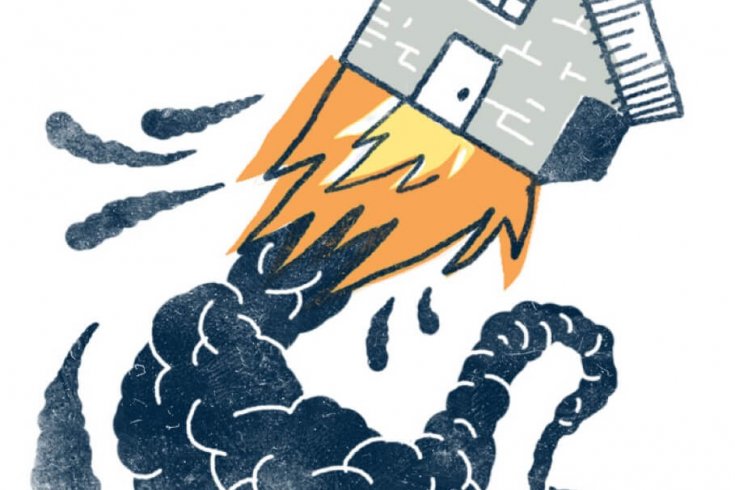
It’s spring, time to bust out the double denim—but what’s this in the pocket of your jean jacket? Twenty dollars! With such a windfall, why not start thinking about trying to think about talking to someone about thinking about buying your first home? Don’t dither; it’s a fantastic idea! Like learning to snowboard after the age of thirty-five, home ownership can be one of the most joyful and pathetic, bruising experiences of your life.
Homes come in many forms, from dung shacks to repurposed aircraft carriers. Which one makes you feel most covetous and inadequate? That’s the home for you, friend, and nothing should stop you from having it—not cost, not common sense, not a lack of breathable atmosphere on the surface of the moon. This is why our brave soldiers are fighting in Afghanistan, and shame on anyone who suggests they are doing so in vain.
Buying a dream home is not something to be taken lightly, like municipal elections or burying industrial waste. The first step is finding a dream home to buy. Listings are one place to begin your search. Alternatively, try prowling around late at night, peering into the windows of interesting properties; this is called casing the joint, and is best done dressed in black. Experienced professionals are integral to the process, preferably in the form of a clairvoyant, soothsayer, or shaman. Failing that, a CREA-member realtor will do.
People generally think of realtors as sweaty, histrionic figures who dress like ’80s parking valets and desperately compromise their integrity for dubious “leads.” In truth, they’re just like the rest of us, plundering strangers’ insecurities for personal and capital gain. A good realtor will help you find a home in your search area and price range. An excellent realtor will do your laundry, clean your bathroom, and put out the trash. And a dream realtor will hold you, whispering, “Shh, shh,” all night long while the lambs are screaming.
Once you find a home that meets your needs (e.g., mirrored ceilings, gun turrets, and adequate basement space for your “experiments”), you will have to make an offer. This should fall somewhere between the seller’s asking price and the paltry and hilarious amount you can actually afford. Despite its name, lowballing, no sexual favours are exchanged at this stage.
From here, the seller might reply with a counter-offer. While negotiation is undeniably obnoxious, think of it as a game—specifically an Aztec game of rugby in which the victorious team decapitates the losers and rolls their heads through the streets. An important note: avoid the Price Is Right strategy of glancing around in a mild panic before screaming, with unconvincing arrogance, “One dollar!”
Sometimes, if several parties are interested in a property, multiple offers will escalate into a bidding war. At this point, all bets are off—excepting, of course, the bets of bids, which are a bit better than bitter bets, but bed bats best by biting butter-battered butts.
Just having some fun.
If by some miracle your bid trumps all others, unless you’re a Nigerian Internet prince you’ll need to borrow some money to pony up. This is called a fucking mortgage. From the French mort (dead) and “gag” (a scrap of dirty oilcloth stuffed in a kidnap victim’s mouth), a mortgage is a sort of pecuniary blood oath between you—the homebuyer—and The Bank.
Obtaining a mortgage is only the beginning of a long, abusive, and humiliating relationship that will follow you to your watery grave—assuming, by that point, all you’ll be able to afford is a burial at sea (or lake, or kiddie pool). The Bank will require proof that your income is derived from more than pawning VHS tapes and used cross-country skis, and may also insist on something totally unfair called a credit check. (Having never passed this stage myself, I’m basically winging it from here on out.)
Should you wangle your way through this financial gauntlet, before finalizing any sale always have a home inspector and/or ghostbuster check the wiring, foundation, and baseboards of the house for ectoplasmic residue. This person will also ensure that the property comes with a roof and floors, and that you are not shelling out five hundred grand for an oversized turkey blind.
Once the sale is final (the closing) and you and your realtor have celebrated by getting blind drunk (the falling off the wagon), you will take possession. To those who have seen Andrzej Zulawski’s film of the same name, expect the same process—crippling anxiety, a demonic loss of selfhood—and, like Anna, you shall only ever have yourself to blame as “the maker of [your] own evil.”
From receiving the keys to your new place to that fateful afternoon when you head down to the basement to dig a 1972 Montreal Star from the bottom of a precariously towering pile, home ownership can be a source of much joy and contentment—“can” being the operative word. I mean, renting can be okay, too. So can squatting. So can riding the rails, lulled to sleep by the steady clatter of your dream house-on-wheels traversing this magnificent land. You might even dream that your hay bales are a waterbed, the boxcar a charming bungalow that you and The Bank own together—and here comes The Bank in its nightgown, padding across the carpet with a snifter of brandy, which it hands to you, then whisks away and chugs, cackling the malevolent laughter of the devil while fire and blood pour from its eyes…
Isn’t that a fine place for such things—dreams?
Deep-Six Figures
Tunnelling underground for luxury homes
If you’re looking for an unconventional fixer-upper and don’t mind a lack of sunlight, you might consider purchasing a missile silo. In the early ’80s, schoolteacher Ed Peden and his wife, Dianna, bought a decommissioned silo in eastern Kansas. Although the massive structure cost the US government $25 million (by Ed’s estimate) to build in the early ’60s, it had since been abandoned. The couple obtained it for $40,000 (US), then converted it into a 560-plus-square-metre luxury home (with an additional 280 square metres of garage space), featuring a hot tub, and expansive living quarters in the former launch control room; they named it Subterra Castle. Since then, the Pedens have started a real estate company that specializes in former missile silos, many of which have been out of use since the Cold War ended. Unfortunately, not even sunken homes are safe from the effects of gentrification. Silo prices have escalated steeply in recent years: the properties featured on the Pedens’ website, missilebases.com, range from $260,000 to $2.8 million (US).
—Amelia Schonbek
This appeared in the June 2011 issue.





